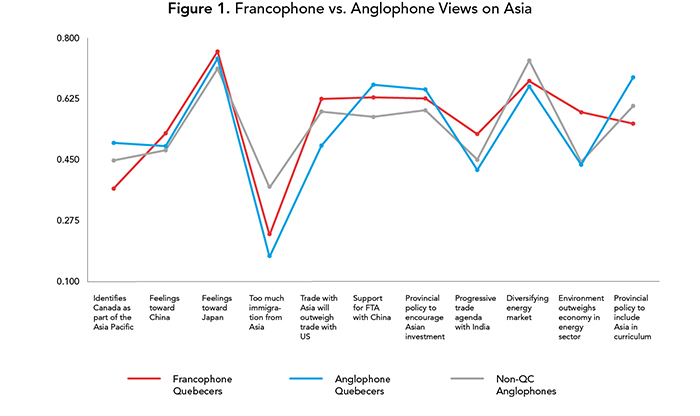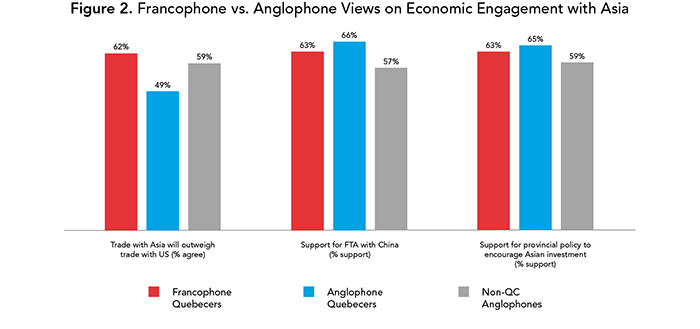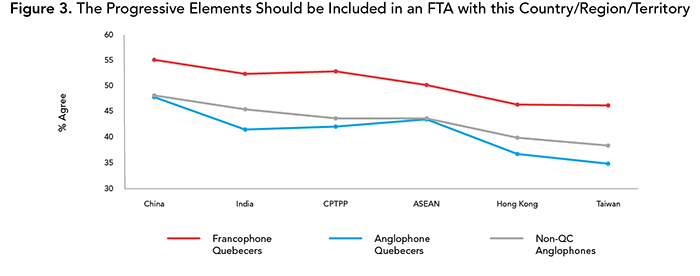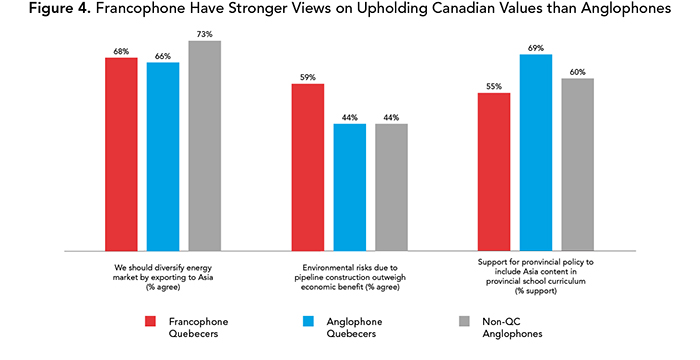The province of Quebec and its French-speaking population has often been regarded as having different attitudes toward foreign and military affairs than other Canadians, particularly anglophone Canadians. This different perspective on foreign affairs and other social issues has sometimes created a national division known as the “two solitudes.” But does this cultural-linguistic difference among Canadians also translate into different perceptions of Asia?
Surveys have shown that Canadian perceptions about Asia vary across provinces/territories. For example, the Asia Pacific Foundation of Canada’s National Opinion Polls (NOPs) consistently show that Quebecers tend to have different attitudes toward Asia from residents in other parts of Canada, such as British Columbia or Alberta. But how important is the interprovincial disparity vis-à-vis the cultural-linguistic divide in shaping Canadian public opinion regarding Asia? In response to this question, this blog compares francophone versus anglophone views on Asia based on the 2018 NOP conducted by APF Canada.
We define francophones as those who indicated French as a mother tongue and filled out the NOP questionnaire in French, while anglophones refer to those who indicated English-only as their mother tongue and filled out the questionnaire in English. The two groups (669 francophones and 2,570 anglophones) present similar demographic profiles in terms of gender, age, and education. In other words, these demographic factors may not be the main drivers of differences between the two groups. In terms of regional distribution, 96% of francophones in our sample reside in Quebec, while within the province francophones represent 78% (644 respondents) of the sample, and anglophones make up 15% (127 respondents).
In order to disentangle the cultural effect (francophone versus anglophone) from the provincial effect (Quebec versus other provinces), it is necessary to compare francophone Quebecers’ attitudes against those of anglophone Quebecers (the cultural effect), and to compare anglophone Quebecers versus anglophones outside Quebec (non-QC anglophones) (the provincial effect). To that end, we excluded the 25 francophone respondents who reside outside Quebec for this analysis.
The chart below (Figure 1) presents an overview of the three groups’ attitudes toward Asia on key metrics. A higher value means a more positive or supportive response to each statement or question. As the chart shows, francophone and anglophone attitudes toward Asia tend to have more similarities than dissimilarities. Yet, their views on Canada-Asia engagement do diverge to some extent on specific issues.
 Francophones Have a Weaker Asia Pacific Identity but Warmer Feelings to Asia
Francophones Have a Weaker Asia Pacific Identity but Warmer Feelings to Asia
Interestingly, francophones feel less connected to the Asia Pacific region than both anglophone groups – 37% of francophones see Canada as part of the Asia Pacific, much lower than 50% for anglophone Quebecers and 45% for non-QC anglophones. On this question, the provincial effect appears to carry less weight than the cultural-linguistic factor as the two anglophone groups possess closer views.
Many factors are at play here, but one potential explanation stems from uneven media coverage of Asia across Canada. It has been highlighted that French-speaking media have a somewhat more domestic or regional focus than English media in Canada. As mass media such as TV, radio, and newspaper is the primary source for the majority Canadians to learn about Asia, and as media coverage is likely to influence perception, we can speculate that less coverage of Asia in French media negatively affects the sense of belonging to the Asia Pacific region.
However, despite a weaker Asia Pacific identity, francophones tend to have slightly warmer feelings toward the two major Asian economies, i.e. China and Japan, than both anglophone groups. Francophones also have a more positive view on Asian immigration than anglophones outside Quebec, with 23% saying “there is too much immigration from Asia in Canada” as opposed to 37% for non-QC anglophones. Interestingly, an even lower percentage of anglophone Quebecers (17%) holds this view – this suggests that the difference in attitude toward Asian immigration reflects more of a provincial difference rather than an ethno-linguistic divide.
Part of the interprovincial differences may be explained by a relatively small share of Asian immigrants in Quebec. According to the 2016 Census, only 4% of Quebecers self-identified as an Asian visible minority, and only 3% speak an Asian language as their mother tongue. In contrast, British Columbia has the largest share of both groups at 26% and 19%, respectively, and its population tends to have less a positive attitude toward Asian immigrants.
Francophones are Open to Economic Engagement with Asia
Francophones are more optimistic than anglophones about the future of trade relations with Asia and are supportive of strengthened trade and investment relationships with Asia (Figure 2). 62% of francophones believe that trade with Asia will outweigh trade with the U.S. in ten years, compared to 49% for anglophone Quebecers, and 59% for non-QC anglophones.
Support for a Free Trade Agreement (FTA) with China is also widespread among francophones (63% support), although slightly lower than anglophone Quebecers (66%) but higher than non-QC anglophones (57%). This observation echoes a finding from a recent Quebec survey by a UBC team. The majority (63%) of francophones would also like to see additional provincial policies to attract more investment from Asia, a result similar to anglophone Quebecers.
The differences in the three groups’ attitudes toward an FTA with China and Asian investment appear to be more along the regional line than the cultural-linguistic line; and this may have to do with Quebec increasingly benefiting from trade with Asia (the share of trade with Asia has increased from 8% in 2000 to 16% in 2017) and the Quebec government’s emphasis on strengthening ties with Asia.
 Francophones are More Value-centric than Anglophones in Canada’s Approach to Asia
Francophones are More Value-centric than Anglophones in Canada’s Approach to Asia
Despite an overall optimism about economic engagement with Asia, francophones seem to be more value-centric than anglophones when it comes to trade negotiations with Asian economies. A significantly higher proportion of francophones thinks the ‘progressive trade elements’ should be included in FTAs with all major Asian economies. The gap between the two groups within Quebec is even larger when respondents are asked about India, Hong Kong, and Taiwan (Figure 3).

Francophones are also more reluctant than anglophones to engage with Asia in the energy sector – they are less supportive of diversifying the Canadian energy market and more concerned about environmental risks due to oil/gas transportation (Figure 4). Within Quebec, there is a real divide (15 percentage point difference) between francophone and anglophone attitudes toward environmental issues.
While francophones are no different from anglophones in strongly supporting provincial policies to promote opportunities for Canadian students to gain grounded experiences in Asia, they are much more hesitant to have Asian content in the provincial school curriculum, and the divide is even larger within the province (Figure 4).

The stronger views of francophones on promoting a progressive trade agenda and the environment, and their reluctance toward increasing Asia-related content in the provincial curriculum may speak to the concerns francophones have with the protection of their language and identity. While Canadians in general show reservations in these areas, these concerns are even more pronounced among francophones.
Conclusions
By looking into the cultural-linguistic divide in Canadian views on Asia, we highlighted some convergences and divergences between francophones and anglophones. Some of these differences align with interprovincial disparity between Quebec and other parts of Canada more than the cultural-linguistic division; yet, when it comes to areas where Canadian values could be imperiled, a significant gap exists between the two linguistic groups within Quebec. While we proposed plausible factors to explain this gap in perceptions, further research is needed for a better understanding of these differences.
The overall differences between francophones and anglophones in their perception of Asia, while not fundamental, are important enough to warrant attention from policy-makers. Finding a way to reconcile the perceptions and interests between the two linguistic groups and to bridge the gap will be essential for both the federal government and the Quebec government to craft an effective and well-received policy regarding Asia.
Read other blogs in our 2018 NOP Blog Series:
Introduction: Canadian Views on Asia: The 2018 National Opinion Poll Blog Series
Blog One: Are Francophones and Anglophones so Different in Their Views on Asia?
Blog Two: Energy Exports and Asia: Divergent Western Canadian Perspectives
Blog Three: Accessing Asia: Is Canada Falling Behind?
Blog Four: A Difference of Opinion: Canadian Provincial Views on Asia
Blog Five: More Exports to Asia Requires More Internships in Asia





